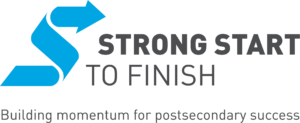“Strong Start to Finish enables colleges to think deeply about their structure and the experiences they are designing for students to help them achieve the goals they set for themselves. When our colleges are being asked to do more with less, this type of support is critical to helping our colleges deliver on America’s higher education promise.” — Michael Baston, president, Rockland Community College
This is exactly what Strong Start to Finish set out to do when it launched in 2017. By bringing together equity-minded institutional leaders and evidence-based practices and research, Strong Start to Finish aims to help colleges and universities increase the number and proportion of low-income students, students of color and returning adults who succeed in college math and English.
These foundational courses are necessary for most college degrees, but for too many students without adequate preparation and support, they become barriers to persistence and ultimately, graduation. Strong Start to Finish aims to fix that by making entry into college more supportive: re-envisioning advising, revising placement policy and practice to remove barriers to these courses and developing course pathways that keep students on track toward graduation.

Since its launch, Strong Start to Finish — which we house here at Education Commission of the States — has expanded to include more than 250 institutions impacting nearly 3.7 million students. The network now includes the California Community College Chancellor’s Office, City University of New York, Ohio Department of Higher Education, State University of New York, University System of Georgia, and a partnership between the Arkansas Community Colleges and Arkansas Department of Higher Education.
And its work is well underway: For example, in Georgia, leaders are revamping new student advising and onboarding to better support students and help them follow course pathways that will lead to graduation. They’re also developing course maps to help guide students and limit unnecessary credit accumulation. And in Ohio, leaders are hosting statewide implementation forums to support the implementation of evidence-based practices in the areas of course placement, advising, corequisite models, data use and gaps in equitable access and success.
Others are working toward eliminating standalone remedial courses in math and English, which students are historically placed into if placement tests deem them underprepared for college-level coursework. In Arkansas, through a partnership between Arkansas Community Colleges and Arkansas Department of Higher Education, leaders aim to place all students in college-level math and English — and for those students who need additional support, they provide supplemental instruction and help. This means all students can take credit-bearing courses while getting up to speed, avoiding any lost time or money that happens when taking remedial courses that won’t count toward a degree.
The City University of New York, one of the first partners to join Strong Start to Finish, is already hard at work on this. “Strong Start to Finish has enabled CUNY to make great progress in scaling up the corequisite model over the past year,” David Crook, associate university provost for academic affairs at CUNY, tells us. “We have not only created goals and accompanying metrics, but also been able to develop the necessary courses and train faculty to teach them.”
That’s the beauty of Strong Start to Finish and other initiatives like it. Rather than working individually to create lasting change on one campus or a network of campuses, Strong Start to Finish is bringing together education leaders across institutions and states to scale these changes, creating broader change and better outcomes for more students.
“Strong Start to Finish has given me the opportunity to share what has been success at [Borough of Manhattan Community College] to help other schools build their accelerated math programs,” says Susan Licwinko, math professor at BMCC. “It is wonderful to know that I am contributing to the development of accelerated programs and impacting thousands of students across the city.”
We’re pleased to support this work, and we look forward to continuing to watch it grow. Follow along with us by subscribing to monthly updates from the Strong Start to Finish team.










